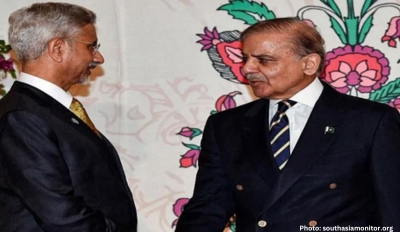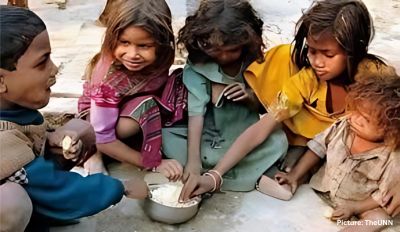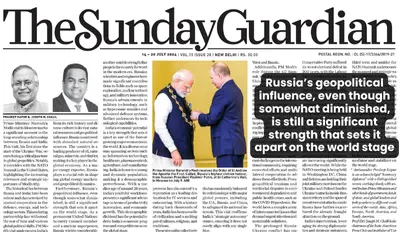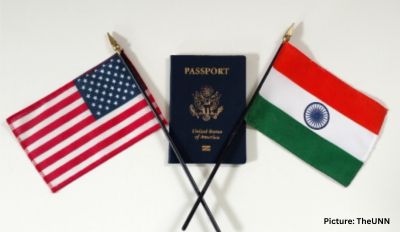The belligerent provocation of various Indian minorities has raised ethnic tensions, says Moody’s Analytics in a report that warned of “a possible increase in violence.” In a report titled, “India Outlook: Searching for Potential,” Moody’s Analytics, a division of Moody’s Corporation, said: “Along with a possible increase in violence, the government will face stiffer opposition in the upper house as debate turns away from economic policy.”
Moody’s Analytics, a top economic policy research and analysis institution, said the politics need to improve and the government’s reform agenda needs attention to achieve long-term growth. While the government met with obstructionist opposition in the upper house with regard to crucial reform measures, the ruling party also hasn’t helped itself with controversial comments by its members, Moody’s Analytics said.
 The Indian economy is likely to grow at 7.6 percent this year and in 2016 while closing of negative output growth is going to be difficult due to external headwinds and the government failing to deliver on reforms, Moody’s was quoted to have said. “Overall, it’s unclear whether India can deliver the promised reforms and hit its growth potential. Undoubtedly, numerous political outcomes will dictate the extent of success.”
The Indian economy is likely to grow at 7.6 percent this year and in 2016 while closing of negative output growth is going to be difficult due to external headwinds and the government failing to deliver on reforms, Moody’s was quoted to have said. “Overall, it’s unclear whether India can deliver the promised reforms and hit its growth potential. Undoubtedly, numerous political outcomes will dictate the extent of success.”
According to a New York Times report, “First writers then artists, followed by filmmakers, historians and scientists. The chorus of Indian intellectuals protesting religious bigotry and communal violence grows louder by the week with a single message for Prime Minister Narendra Modi: protect India’s tradition of secularism and diversity.”
Those protesting are angry and worried by a spate of deadly attacks against atheist thinkers and minorities, and by Modi’s relative silence through it all. That silence appears to have encouraged some of his party colleagues to make comments asserting Hindu pride and superiority.
Last week, more than 100 scientists, including some of India’s top nuclear physicists, space scientists and mathematicians, expressed their anguish at the ways in which they said “science and reason were being eroded in the country.” The protest by scientists is significant, given that most work for the government or in state-funded organizations and so could risk being punished for speaking out.
“What we are witnessing instead is the active promotion of irrational and sectarian thought by important functionaries of the government,” the scientists said in a statement. They said the dozens of Indian writers who have returned national awards in protest had “shown the way.”
As per media reports, there have been other incidents in recent years, including the killings of three atheist scholars who had campaigned against religious superstition, and more mob killings over rumors of cow slaughter or smuggling. Many Hindus, who make up more than 80 percent of India’s population of 1.25 billion, consider cows to be sacred, and many states ban the slaughtering of the animals.
Scientists as well as historians have said they are increasingly alarmed by government attempts to rewrite Indian history by distorting facts about a glorious Hindu past. “I fear that we are losing our democracy and replacing it with a Hindu religious autocracy,” said molecular biologist P.M. Bhargava, adding that he would be returning a national award in protest. “I would not like to live in a country that has lost its democracy and has become a theocratic state.”
Infosys founder NR Narayana Murthy on Saturday expressed concerns that there is considerable fear in the minds of minority in India and said the governments should bring back the sense of confidence in them. “I am not a politician, I am not interested in politics, therefore, I don’t want to comment on that but the reality today is that there is considerable fear in the minds of minority in India,” he said. He said there was also “considerable fear” in the minds of people of one region living in another region. Citing the Shiv Sena campaign against the South Indians living in Mumbai in 1960s, he said, “Today there is a lot of that worry. I get lots of emails, I get a lot of people talking to me even though I stay at home because of my leg.”
 No country, the IT veteran said, has ever made steady economic progress unless “there is no distrust, there is no fear, unless the majority community doesn’t oppress the minority community, doesn’t want the minority community to do what it wants etc.”
No country, the IT veteran said, has ever made steady economic progress unless “there is no distrust, there is no fear, unless the majority community doesn’t oppress the minority community, doesn’t want the minority community to do what it wants etc.”
Communal violence and prejudice are nothing new for India, born as a secular democracy in 1947 amid deadly Hindu-Muslim riots that killed an estimated 1 million people as Muslim-majority Pakistan was carved out of mostly Hindu India with the end of British rule. Since then, horrific riots and clashes have erupted at intervals, mostly between Hindus and Muslims.
Yet India has still largely been seen as overwhelmingly tolerant, with a cacophony of cultures that have lived side by side for centuries. Secularism is enshrined in its constitution. Worries over India’s secular identity began rumbling before Modi was elected prime minister last year. Modi and his Hindu nationalist Bharatiya Janata Party won the election in a landslide, largely on promises of lifting the economy.
But some cautioned that his support was grounded in the party’s Hindu base, and noted that Modi himself had come up through the militant Hindu fundamentalist organization Rashtriya Swayamsevak Sangh, which translates as the National Volunteers Association. For years, the group has been accused of stoking anti-Muslim prejudice, including among teenagers attending youth camps.
Modi, having dodged allegations of responsibility for deadly 2002 riots in Gujarat, insisted during his election campaign that he would be prime minister for all of India and guaranteed protection for minorities. Since taking office, however, Modi has said very little on the subject of tolerance and diversity, even questioning why his government should be called on to comment on local matters.






